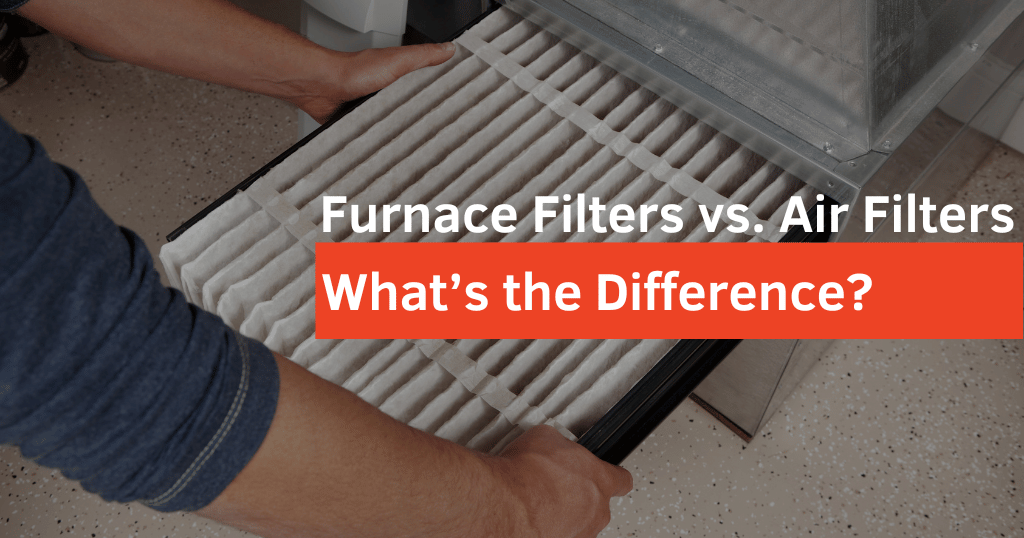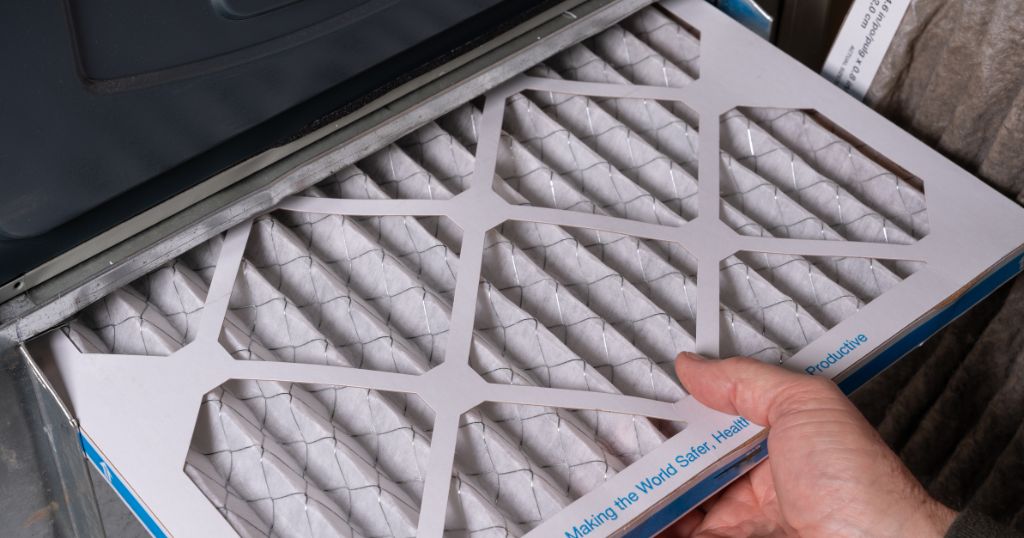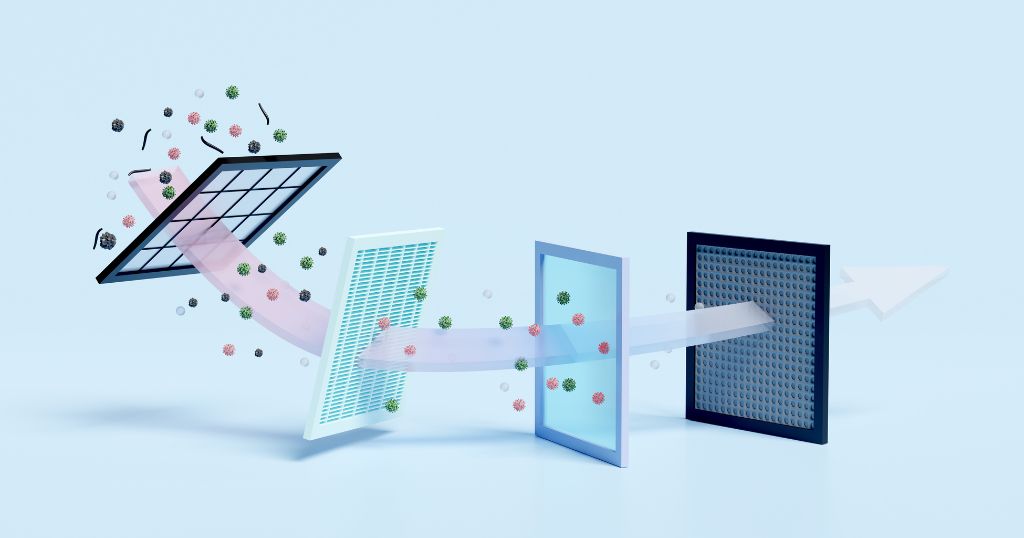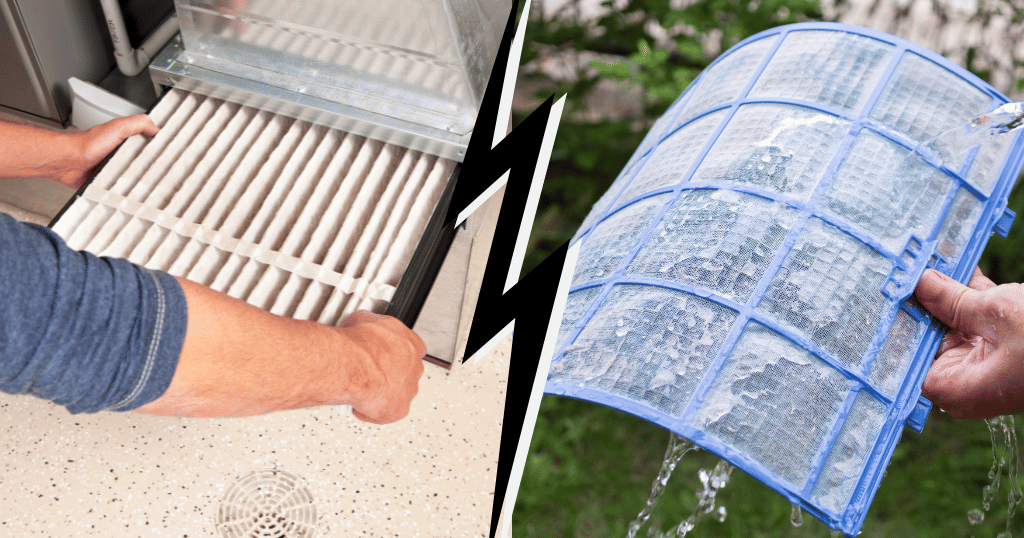All filters are made in the USA – Order Today

Your central air conditioning and heating system has several essential components, and air filters are among them. Without filters, you cannot even imagine the proper functioning of your heating and cooling equipment. Two filter types exist in your central air cooling and heating system – air and furnace filters.
While most of the reader might be familiar with air filters, not the latter because they use the term “air filters” interchangeably with other words like “furnace filters” and “HVAC filters.” However, there is some difference between the two. Knowing this difference will save you from confusion at the hardware store when asked, “Furnace filters or air filters? What do you need?”
If you don’t want to face such a situation, read this article on the difference between furnace filters and air filters. So, let’s dive deep into this blog without any further ado.

Furnace filters are one of the most important components of your heating system, quietly working to improve indoor air quality and maintain the efficiency of your HVAC setup. To grasp their significance, let’s delve into the essentials:
Furnace filters serve an important role in trapping airborne particles before they circulate through your home. By capturing dust, allergens, and debris, these filters not only enhance the air you breathe but also protect the internal components of your heating system from potential damage.
Various types of furnace filters are available in the market, each with its own set of characteristics. Common varieties include fiberglass filters, pleated filters, and electrostatic filters. Understanding the differences between them is key to selecting the right filter for your specific needs.
As we navigate the intricacies of furnace filters, keep in mind that choosing the right one for your heating system involves considering factors such as filtration efficiency, maintenance requirements, and compatibility with your HVAC setup. In the next sections, we’ll further explore the world of air filters and uncover the distinctions between these essential components.

Now you are familiar with furnace filters, let’s learn about air filters without any delay. Here’s everything that you need to know about air filters:
Air filters are integral to your heating, ventilation, and air conditioning (HVAC) system, designed to trap and remove particles from the air. By capturing pollutants like dust, pet dander, pollen, and mold spores, air filters contribute significantly to improving indoor air quality.
Just like furnace filters, various types of air filters exist, each with its unique characteristics:
Understanding these options is essential for selecting the most suitable air filter for your specific needs. Now that you have the basics of both furnace filters and air filters, it’s time to determine the key differences between furnace filters and air filters.
When it comes to maintaining indoor air quality and optimizing HVAC systems, understanding the differences between furnace filters and air filters is essential. Let’s break down the key differences that differentiate these important components:
| Aspect | Furnace Filters | Air Filters |
|---|---|---|
| Primary Purpose | Capture particles to protect the heating system | Trap pollutants for enhanced indoor air quality |
| Types | Fiberglass, Pleated, Electrostatic, etc. | HEPA, Carbon, Electrostatic, etc. |
| Filtration Efficiency | Varies based on type; effective against larger particles | Varied; HEPA filters offer high efficiency for fine dust |
| Usage in HVAC Systems | Specifically designed for heating systems | Integral part of heating, ventilation, and AC systems |
| Cost Considerations | Generally cost-effective; price varies by type | Costs vary based on filter type and filtration efficiency |
| Maintenance Requirements | Regular replacement necessary; frequency varies | Regular replacement essential; depends on filter type |
1) Primary Purpose:
2) Types:
3) Filtration Efficiency:
4) Usage in HVAC Systems:
5) Cost Considerations:
6) Maintenance Requirements:
Understanding these key differences will help you to make informed decisions when selecting filters for your HVAC system, ensuring optimal performance and a healthier indoor environment for yourself and your loved ones.

Selecting the appropriate filter for your HVAC system is essential for maintaining indoor air quality and optimizing overall system performance. Here are some tips for choosing the right filter for your needs:
While choosing filters for your furnace-only system or HVAC system, first, you have to identify your goals. Are you primarily focused on protecting your heating system or improving indoor air quality? Understanding your priorities will guide your search for the best filter for your needs.
Once you identify your goals, determine the type of HVAC system you have. Whether it’s a furnace-only system or a comprehensive heating, ventilation, and air conditioning (HVAC) system. Different systems may have specific requirements for filters.
1) Furnace Filters:
2) Air Filters:
If you want to choose the best filter for your needs, make sure to check the filtration efficiency before you buy. HEPA filters, for example, excel in capturing very fine particles. However, it may strain your HVAC system, so ensure you choose the right MERV rating that is also suitable for your HVAC system.
Evaluate the initial cost and replacement costs of filters. While some filters may have a higher upfront cost, they may offer better long-term value.
Be aware of the maintenance needs of the chosen filter. Regular replacement is essential for optimal performance, so choose a filter that aligns with your maintenance preferences.
Make sure you choose an air filter that is compatible with your HVAC system. Some systems may require specific filter dimensions or types for efficient operation.
If you’re uncertain about which filter is best for your needs, consult with HVAC professionals. They can provide tailored recommendations based on your system and air quality requirements.
By considering these factors, you’ll be equipped to choose a filter that not only suits your HVAC system but also aligns with your specific goals for indoor air quality. Making an informed decision ensures a healthier and more comfortable living environment for you and your family.
Furnace filters and air filters play a crucial role in maintaining indoor air quality and optimizing HVAC systems. While furnace filters are specifically designed to protect the heating system by capturing larger particles, air filters aim to trap pollutants for enhanced indoor air quality. Both types of filters come in various types, with different filtration efficiencies and maintenance requirements.
It’s essential to understand the differences between the two to make an informed decision when selecting the most suitable filter for your specific needs. If you are in need of air filter replacement and looking for high-quality HVAC air filters, you can connect with the experts of Custom Filters Direct. Our experts will assist you in choosing the right filter for your HVAC system. Call us at 1-877-958-5612 today!
Yes, the furnace filter plays a vital role in purifying the air within your home. While its primary function is to protect the heating system by trapping larger particles, it simultaneously contributes to improved indoor air quality. Furnace filters capture dust, allergens, and contaminants, preventing them from circulating through the HVAC system and dispersing into living spaces.
This filtration process results in cleaner, healthier air for occupants, making furnace filters an integral component in creating a comfortable and breathable indoor environment. Regular maintenance and proper selection of furnace filters further enhance their effectiveness in purifying the air you breathe.
Certainly, furnace filters significantly contribute to improving indoor air quality. These filters act as barriers, capturing particles such as dust, allergens, and pollutants as air circulates through the HVAC system. By preventing these contaminants from re-entering living spaces, furnace filters effectively enhance the cleanliness and overall quality of the air inside your home. Regularly replacing and maintaining furnace filters is key to ensuring their optimal performance and continued positive impact on air quality.
Using furnace filters is essential for several reasons. Firstly, furnace filters protect your heating system by trapping dust, debris, and other particles, preventing them from reaching sensitive components. Secondly, these filters play a pivotal role in improving indoor air quality by capturing allergens and pollutants, creating a healthier living environment.
Additionally, furnace filters contribute to energy efficiency by maintaining the cleanliness of the system, ensuring it operates smoothly. Regular use of furnace filters not only prolongs the lifespan of your HVAC equipment but also promotes a more comfortable and breathable atmosphere in your home.
The furnace filter and the return air filter are often the same components in residential HVAC systems. The return air filter is positioned in the return duct, where it captures airborne particles before the air is pulled into the furnace or air handler for heating or cooling. This filter serves the dual purpose of protecting the heating or cooling equipment and improving indoor air quality. While the terms “furnace filter” and “return air filter” can be used interchangeably in some contexts, it’s essential to note that variations exist in commercial or specialized HVAC setups.
HEPA filters are widely regarded as highly effective in capturing allergens in the air. The acronym “HEPA” stands for High-Efficiency Particulate Air, indicating their exceptional filtration capabilities. These filters can capture particles as small as 0.3 microns with high efficiency, making them ideal for trapping allergens like pollen, pet dander, mold spores, and dust mites.
The dense and fibrous structure of HEPA filters allows them to effectively remove a significant portion of airborne allergens, promoting cleaner and healthier indoor air. However, the suitability of HEPA filters depends on individual needs, and factors such as cost, system compatibility, and maintenance requirements should also be considered when choosing air filters.
Have any questions? We’re here and ready to help!
© 2022 Custom Filters Direct. All rights reserved.